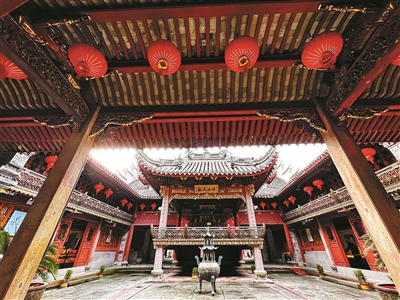
Qing'an Guild Hall. /庆安会馆。 [Photo by Tang Yan] 唐严摄
By Xu Zhuowei
Qing'an Guild Hall, built in the Qing Dynasty, is located on the east bank of Ningbo's Yong River and was also known as the Yongdong Tianhou Palace (East Ningbo's Heavenly Queen Palace). It is one of China's major historical and cultural sites protected at the national level, a landmark of Ningbo, and an important legacy of the Ningbo section of China's Grand Canal.
庆安会馆位于宁波三江口的甬江东岸,又称“甬东天后宫”,是清代古建筑。它被列为全国重点文保单位,是宁波港口城市的标志性建筑,也是中国大运河(宁波段)的重要文化遗存。
Qing'an Guild Hall was built with donations from Ningbo ship merchants who did business in the Yellow Sea. It was a hall for merchants and residents to worship Mazu (the sea god venerated by China's coastal communities), a place for business gatherings, and a performance venue. Now it has been rebuilt into the first museum of maritime folk customs in China.
庆安会馆由清时甬埠北洋船商捐资创建,是商贾、民众祭祀天后妈祖(中国沿海百姓崇拜的海神)的殿堂和行业议事聚会的场所,现已改建为全国首家海事民俗博物馆。
Qing'an Guild Hall witnessed the development of Ningbo's early international trade and shipping; it is also evidence of Mazu worship's presence in Ningbo, a port city with a community of active merchant mariners in the maritime sector. Shipping guild members who worshiped Mazu and wanted to make business connections would take part in the Guild Hall's activities. The establishment of the Guild Hall contributed greatly to the development of Ningbo's shipping industry at that time.
庆安会馆见证了宁波早期对外贸易史、海外航运史,也是妈祖文化的物证。在宁波这座港口城市,舶商们热衷投入沿海贸易,有妈祖信仰兼经济目的的行会成员加盟到会馆这一载体中来。会馆的建立也为当时宁波航运事业的发展作出了重大贡献。


